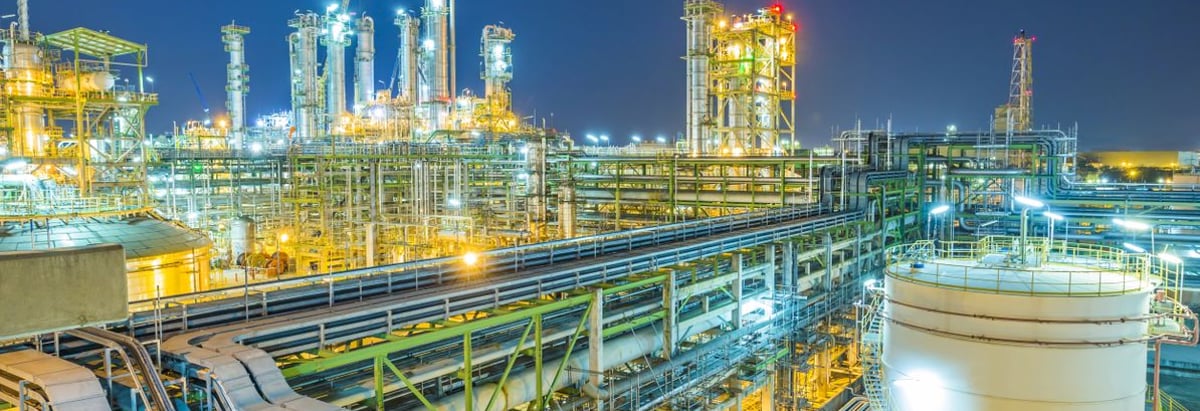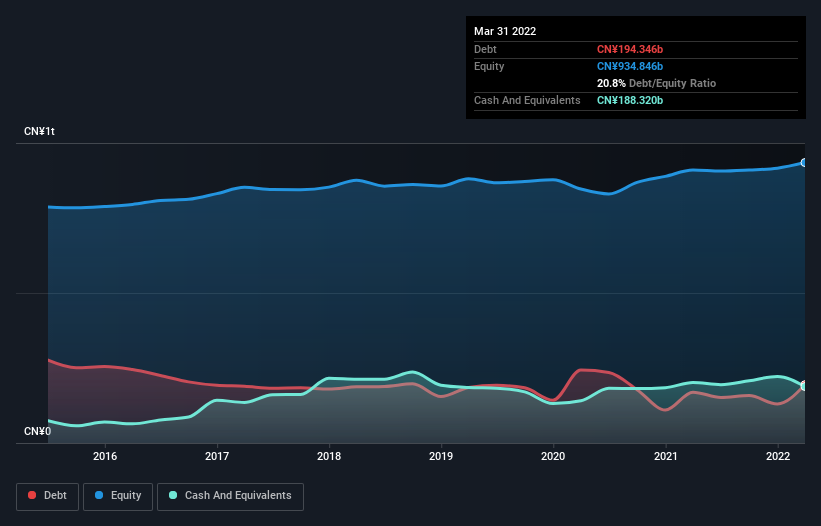- Hong Kong
- /
- Oil and Gas
- /
- SEHK:386
We Think China Petroleum & Chemical (HKG:386) Is Taking Some Risk With Its Debt

Some say volatility, rather than debt, is the best way to think about risk as an investor, but Warren Buffett famously said that 'Volatility is far from synonymous with risk.' So it might be obvious that you need to consider debt, when you think about how risky any given stock is, because too much debt can sink a company. We note that China Petroleum & Chemical Corporation (HKG:386) does have debt on its balance sheet. But should shareholders be worried about its use of debt?
When Is Debt Dangerous?
Debt assists a business until the business has trouble paying it off, either with new capital or with free cash flow. Part and parcel of capitalism is the process of 'creative destruction' where failed businesses are mercilessly liquidated by their bankers. However, a more usual (but still expensive) situation is where a company must dilute shareholders at a cheap share price simply to get debt under control. Of course, debt can be an important tool in businesses, particularly capital heavy businesses. The first thing to do when considering how much debt a business uses is to look at its cash and debt together.
See our latest analysis for China Petroleum & Chemical
How Much Debt Does China Petroleum & Chemical Carry?
You can click the graphic below for the historical numbers, but it shows that as of March 2022 China Petroleum & Chemical had CN¥194.3b of debt, an increase on CN¥169.5b, over one year. However, it does have CN¥188.3b in cash offsetting this, leading to net debt of about CN¥6.03b.

How Strong Is China Petroleum & Chemical's Balance Sheet?
According to the last reported balance sheet, China Petroleum & Chemical had liabilities of CN¥730.0b due within 12 months, and liabilities of CN¥349.3b due beyond 12 months. On the other hand, it had cash of CN¥188.3b and CN¥84.0b worth of receivables due within a year. So its liabilities outweigh the sum of its cash and (near-term) receivables by CN¥806.9b.
The deficiency here weighs heavily on the CN¥470.1b company itself, as if a child were struggling under the weight of an enormous back-pack full of books, his sports gear, and a trumpet. So we'd watch its balance sheet closely, without a doubt. At the end of the day, China Petroleum & Chemical would probably need a major re-capitalization if its creditors were to demand repayment. China Petroleum & Chemical may have virtually no net debt, but it does have a lot of liabilities.
In order to size up a company's debt relative to its earnings, we calculate its net debt divided by its earnings before interest, tax, depreciation, and amortization (EBITDA) and its earnings before interest and tax (EBIT) divided by its interest expense (its interest cover). This way, we consider both the absolute quantum of the debt, as well as the interest rates paid on it.
With debt at a measly 0.027 times EBITDA and EBIT covering interest a whopping 57.4 times, it's clear that China Petroleum & Chemical is not a desperate borrower. Indeed relative to its earnings its debt load seems light as a feather. On top of that, China Petroleum & Chemical grew its EBIT by 75% over the last twelve months, and that growth will make it easier to handle its debt. There's no doubt that we learn most about debt from the balance sheet. But ultimately the future profitability of the business will decide if China Petroleum & Chemical can strengthen its balance sheet over time. So if you want to see what the professionals think, you might find this free report on analyst profit forecasts to be interesting.
Finally, a business needs free cash flow to pay off debt; accounting profits just don't cut it. So it's worth checking how much of that EBIT is backed by free cash flow. Looking at the most recent three years, China Petroleum & Chemical recorded free cash flow of 39% of its EBIT, which is weaker than we'd expect. That weak cash conversion makes it more difficult to handle indebtedness.
Our View
While China Petroleum & Chemical's level of total liabilities has us nervous. For example, its interest cover and EBIT growth rate give us some confidence in its ability to manage its debt. Looking at all the angles mentioned above, it does seem to us that China Petroleum & Chemical is a somewhat risky investment as a result of its debt. Not all risk is bad, as it can boost share price returns if it pays off, but this debt risk is worth keeping in mind. The balance sheet is clearly the area to focus on when you are analysing debt. But ultimately, every company can contain risks that exist outside of the balance sheet. For instance, we've identified 2 warning signs for China Petroleum & Chemical (1 is a bit concerning) you should be aware of.
If, after all that, you're more interested in a fast growing company with a rock-solid balance sheet, then check out our list of net cash growth stocks without delay.
If you're looking to trade China Petroleum & Chemical, open an account with the lowest-cost platform trusted by professionals, Interactive Brokers.
With clients in over 200 countries and territories, and access to 160 markets, IBKR lets you trade stocks, options, futures, forex, bonds and funds from a single integrated account.
Enjoy no hidden fees, no account minimums, and FX conversion rates as low as 0.03%, far better than what most brokers offer.
Sponsored ContentNew: AI Stock Screener & Alerts
Our new AI Stock Screener scans the market every day to uncover opportunities.
• Dividend Powerhouses (3%+ Yield)
• Undervalued Small Caps with Insider Buying
• High growth Tech and AI Companies
Or build your own from over 50 metrics.
Have feedback on this article? Concerned about the content? Get in touch with us directly. Alternatively, email editorial-team (at) simplywallst.com.
This article by Simply Wall St is general in nature. We provide commentary based on historical data and analyst forecasts only using an unbiased methodology and our articles are not intended to be financial advice. It does not constitute a recommendation to buy or sell any stock, and does not take account of your objectives, or your financial situation. We aim to bring you long-term focused analysis driven by fundamental data. Note that our analysis may not factor in the latest price-sensitive company announcements or qualitative material. Simply Wall St has no position in any stocks mentioned.
About SEHK:386
China Petroleum & Chemical
An energy and chemical company, engages in the oil and gas and chemical operations in Mainland China, Singapore, and internationally.
Good value with adequate balance sheet and pays a dividend.


